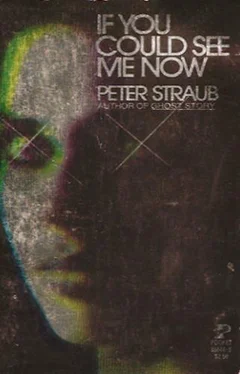In the kitchen the overhead bulb in its shade illuminated the evidence of Tula Sunderson’s work: the plate of cold food had been removed from the table, the dishes washed and put away. When I touched the light switch, it too worked in the usual fashion.
The only explanation was that the wiring had gone massively wrong. At the moment that this possibility came to me I became aware that something — something important — was out of place in the living room. And that my face was still reacting painfully to contact with air. I returned to the kitchen and turned on the taps over the sink and splashed water over my forehead and cheeks. The feverish sandpapered feeling began to lessen. The only soap within reach was dishwashing liquid, and I squeezed a green handful into my right palm and brought it to my face. It felt like balm. The stinging disappeared. Delicately I rinsed away the soap: my skin felt tight, stretched like canvas over a frame.
This transformation, temporary as it was, apparently also made me more acute, for when I was in the living room again, I saw what had caused my earlier sense of dislocation. The picture of Alison and myself, the crucial picture, no longer hung on the nail over the doorway to the stairs. Someone had removed it. I looked around at the walls. Nothing else had been changed. It was an unthinkable violation, a rape of my private space. I rushed into the old bedroom.
Tuta S. had evidently been at work. The mess I had left on the floor had been bundled back into the broken sea chest and the splinters of wood from the chest’s lid were laid out beside it like gigantic toothpicks. I knelt to open the chest and threw up the lid to see Duane’s unhappy mulish countenance scowling at me. I lowered the lid gently. Pandora’s box.
Unless it had been stolen, there was only one place where the photograph could be, and it was there I found it — in fact, even while I was ascending the narrow staircase I knew where I would find it. Propped between wall and desk, beside the earlier photograph of Alison.
And I knew — if the unknowable can be at all said to be known — who had put it there.
Following what seemed to be a general rule about nights spent in the old Updahl farmhouse, my sleep was interrupted by a succession of disturbing dreams, but all I could remember of them when I awoke — too late, I noted, to witness the parting of the lovers on the road and Alison’s athletic, comic entrance through her window — was that they had made me start into wakefulness several times during the night. If you cannot remember them, nightmares lose all of their power. I was as hungry as I could remember ever being, another sign of renewed health.
I was as certain as if she’d left a note that Alison Greening had moved that photograph, and the information that she had influenced another hand to do it for her did not alter my conviction.
“You don’t mind my moving that picture, do you?” said Mrs. Sunderson when I came down for breakfast. “I thought since you had that other one up there, you might want them both. I didn’t mess with anything in that writing room of yours, I just put the picture on your desk.”
Startled, I looked at her. She was working her fat arms over a frying pan. Grease spat, flames jumped. Her face was set in an expression of sullen obduracy.
“Why did you do it?”
“Because of the other one. Like I said.” She was lying. She had been Alison’s agent; it was also clear that she had disliked having the photograph within her view.
“What did you think of my cousin? Do you remember her?”
“Not to speak of.” She went firmly back to the eggs.
“You don’t want to talk about her.”
“No. What’s past is past.”
“In one sense,” I said, and laughed. “Only in one sense, my dear Mrs. Sunderson.”
The “my dear” made her look toward me with magnified goggling eyes. More brooding, puzzled silence over the sizzling eggs on the gas burner.
“Why did you tear up that picture of Duane’s girl? I saw it when I straightened up your mess in the front bedroom.”
“I don’t know what you’re talking about,” I said.
“Oh I do remember. I didn’t really know what it was. It was a random gesture. A reflex.”
“So some would say,” she pronounced as she brought me the eggs. “Maybe some would say the same about that car of yours.”
I could still taste those eggs two hours later when I stood on the asphalt of the Arden filling station beside a squat young man with Hank blazoned over his heart and listened to him groan about the condition of the VW.
“This is some mess,” he said. “I sure hope you got insurance. First off, we ain’t even got a man these days who can beat out those dents for you. And all these is foreign parts. This glass here, and that headlight and missing hubcap. They might be a long time in coming. It’s gonna cost plenty.”
“You don’t have to get them from Germany,” I pointed out. “There must be a VW agency around here somewhere.”
“Maybe,” the boy reluctantly agreed. “I heard about one somewheres, but I can’t remember where it is right now. And we’re all backed up on work. We’re doubling up.”
I looked around at the deserted gas station.
“You can’t see it all,” Hank said defensively.
“I can’t see any of it.” I was thinking that it must have been at this station that the Polish lover of Duane’s fiancée had worked. “Maybe this will help you squeeze it into your schedule.” I took a ten dollar bill from my pocket and folded it into his hand.
“You live here, Mister?”
“What do you think?” He just coolly regarded me. “I’m a visitor. I had an accident. Look. Forget about the dents, they’re not too important, just get the glass and headlights repaired. And take a look at the engine to see if it needs any work. It’s been acting up.”
“Okay. I need a name for the slip.”
“Greening,” I said. “Miles Greening.”
“That Jewish?”
The boy reluctantly parted with one of the garage’s loaners, a 1957 Nash that steered l:like a lumber wagon; further into Arden, I took the precaution of parking it in a side street in an area where the houses appeared to be at least moderately prosperous.
An hour and a half later, I was listening to Paul Kant say to me, “You put yourself and me in trouble just by coming here, Miles. I tried to warn you. You really should have listened. I appreciate your friendliness, but there are only two people that the good folks around here think could have done these crimes, and here we are together. Cozy. If you’re not scared, you should be. Because I’m terrified. If anything else happens, anything else to a child I mean, I think I’m a dead man. They took baseball bats to my car last night, just to let me know they’re watching.”
“Mine too,” I said. “And I saw them working on yours, but I didn’t know whose it was.”
“So here we are, waiting for the other shoe to drop. Why don’t you just get out while you have the chance?”
“I can’t, for several reasons. One of them is that Polar Bears asked me to stay put until everything is over.”
“Because of the Alison Greening business?”
I nodded.
He let out an enormous, scooping sigh, too large for his small body. “Of course. Of course. I didn’t even have to ask. I wish my sins were as far in the past as yours.” I looked up, puzzled, and saw him trying to light a cigarette with a trembling hand. “Hasn’t anybody warned you about being associated with me, Miles? I’m quite a notorious character.”
“Hence the ritual.”
“It’s been a long time since anyone in Arden used a word like hence, but yes, hence the ritual.”
I had come to Paul’s by way of Main Street, where I first stopped in at a shop to buy a portable record player. The clerk looked at the name on my check and disappeared with it into an office at the rear of the shop. I was aware of my presence causing a little flurry of attention among the other customers — they were pretending not to look at me, but they moved with that exaggerated carelessness of people trying to catch every nuance. After a while the clerk returned with a nervous man in a brown suit and a rayon tie. He informed me that he could not accept my check.
Читать дальше












